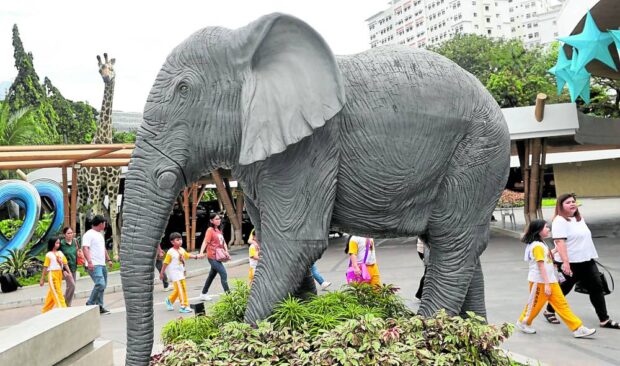Zoo cites cause of Mali’s death; Peta decries ‘abuse’

FAREWELL TO MALI Children on a field trip to Manila Zoo walk past a statue of an elephant, a tribute to the zoo’s longest and most popular resident Mali, who died suddenly on Tuesday afternoon after decades of solitary living. Animal rights group Peta lamented her death, saying that because of indifference and greed, she died as she had lived: “alone in a barren concrete pen.”
—MARIANNE BERMUDEZ
MANILA, Philippines — The “sudden death” of the country’s only resident elephant, Vishwa Ma’ali, or more popularly known as Mali, on Tuesday may have been due to congestive heart failure, according to Dr. Heinrich Patrick Peña-Domingo, chief veterinarian of the Manila Zoo.
“We saw that the aorta, the artery leading out of the heart, was blocked by a layer of fat. This may be the cause of [Mali’s] death … wherein the heart is having trouble pumping out blood to the rest of the body,” he told reporters on Wednesday. Domingo said Mali’s death was “sudden,” saying she was “asymptomatic,” or did not show any symptoms.
“She might have been feeling something, but we would not know. With animals, unlike humans, we cannot ask them what they are feeling. We were monitoring her health constantly, but what happened yesterday was sudden. We could not control it,” he added.
Domingo said Mali started becoming “irritable” on Friday, walking around her enclosure as if she was not feeling well. By Tuesday, caretakers saw her start sitting down before finally laying on the ground around 6 a.m.
Emergency treatment
Alarmed, caretakers started emergency treatment on the elephant, giving her medication, such as antihistamines, vitamin supplements, anticonvulsants and even intravenous fluids. But at 3:45 p.m., Mali died.
Article continues after this advertisementA necropsy showed that the elephant had multiple organ problems. Her pancreas was neoplastic, there were nodules around her liver, her kidneys were slightly inflamed and covered in fat and there were pus deposits in her uterus.
Article continues after this advertisementMali also had cancer, which Domingo admitted they only became aware of after the necropsy.
The elephant was 43 years old, and Domingo said they tend to have a lifespan of around 40 to 45 years. “We also didn’t want this to happen. We wanted to be with Mali longer, but just like humans, animals still have a [set] lifespan,” he added.
In 1981, Sri Lanka gave Mali as a gift to the Manila City government. She became the country’s only elephant after her only companion, Shiva, died in 1990 at 26 years old, according to Manila Mayor Honey Lacuna.
In a statement released on Wednesday, animal rights group People for the Ethical Treatment of Animals (Peta) said that “because of indifference and greed, Mali died the same way she had lived for nearly 50 years—alone in a barren concrete pen.”
The group said it had prepared a sanctuary for the elephant, where she would have been given routine veterinary care while enjoying the company of other elephants.
READ: Manila Zoo eyes another elephant from Sri Lanka in place of Mali – mayor
‘Loneliness’
In 2013, animal rights activists led by Peta and celebrities like Paul McCartney and Morrissey launched a campaign to transfer Mali to an elephant sanctuary in Thailand, citing her health problems and “loneliness.”
They were opposed by other activists who cited her age, saying the transfer would put the elephant under much stress and possibly cause her harm. The Manila City government rejected the proposal and promised to modernize and improve the zoo.
Peta condemned the zoo and the city government for “sentencing Mali to decades of solitary confinement,” which it said was a form of “torture.” Female elephants, it pointed out, tend to spend their lives among fellow mothers, protecting and raising each other’s calves.
“Now, she has lost any chance of happiness,” Peta said.
The group also lamented the country’s lack of an elephant expert, citing Mali’s undiagnosed cancer and painful foot problems that were “ignored” by zoo and city officials.
Responding to a question about Mali’s possible “depression” as the cause of her death, Domingo said that she was not alone because he, as well as her caretakers, had been her family for the over 40 years she lived in the zoo. “We don’t call ourselves elephant experts, we’re Mali experts,” he said.
Large playground
Lacuna said they also ensured Mali had a large enough “playground,” double the size of her previous one. “She had been a big part of our lives in Manila Zoo … While she may be alone, she had us,” she added. As a possible replacement for Mali, Lacuna mentioned that the Sri Lankan government had committed to giving another elephant to the city government. She said she would inform Sri Lanka of Mali’s death, hoping the deal would push through.
Peta, however, called on Sri Lanka to call off its plan, saying it would only sentence the elephant to “decades of mental abuse.”
Lacuna revealed plans to preserve Mali’s bones to be displayed at a museum as she had been Manila Zoo’s “star attraction” and the government’s “prized possession.” “We will do our best to preserve Mali’s memory,” she said.